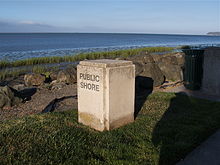- Public property
-
This article is about public ownership. For information on public companies, see Public company.
Public property is property, which is dedicated to the use of the public. It is a subset of state property. The term may be used either to describe the use to which the property is put, or to describe the character of its ownership (owned collectively by the population of a state). This is in contrast to private property, owned by an individual person or artificial entities that represent the financial interests of persons, such as corporations.[1] State ownership, also called public ownership, government ownership or state property, are property interests that are vested in the state, rather than an individual or communities.[2]
Crown property
In the modern representative democracy, "public property" is said to be owned by the people as a commons or held in trust by the government for common benefit. In many Commonwealth realms, such property is said to be owned by the Crown. Examples include Crown land, Crown copyright, and Crown Dependencies.
See also
- Commons
- Constitutional economics
- Public space
- Res extra commercium
References
- ^ Clarke, Alison; and Paul Kohler (2005). Property law: commentary and materials. Cambridge University Press. pp. 207. ISBN 0521614899, 9780521614894. http://www.google.com/books?id=JnzxTbFwdLMC&dq=%22public+property%22+property+theory&lr=&as_brr=3&source=gbs_navlinks_s.
- ^ Clarke, Alison; and Paul Kohler (2005). Property law: commentary and materials. Cambridge University Press. pp. 40. ISBN 0521614899, 9780521614894. http://www.google.com/books?id=JnzxTbFwdLMC&dq=%22public+property%22+property+theory&lr=&as_brr=3&source=gbs_navlinks_s.
Categories:- Property law
- Political economy
- Law stubs
Wikimedia Foundation. 2010.

